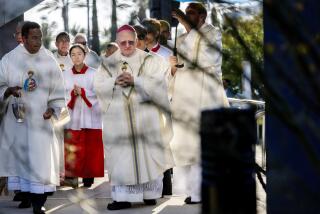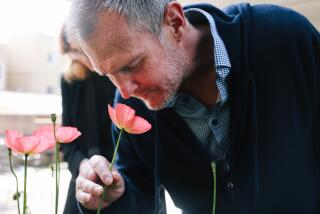Witness in Clergy Malpractice Trial Is Ex-Minister : Psychologist Assails Church’s Counseling Policy
- Share via
A psychologist who once was a minister criticized the pastoral counseling program at Grace Community Church of the Valley Tuesday, saying it teaches a clergyman to commit “the ungodly sin to be God and not a counselor.”
Bill Adams testified in Glendale Superior Court on behalf of Walter and Maria Nally of Tujunga, who are suing the Sun Valley church for negligence in the 1979 suicide of their 24-year-old son, Kenneth.
Adams said he has been a licensed clinical psychologist since 1966 after serving as a minister at Trinity Bible Church in South Gate from 1950 to 1966. He was called as an expert witness by Nally family attorney Edward Barker and was asked to evaluate the counseling program that existed at the church in 1979.
Adams criticized the Rev. Richard A. Thomson, one of four defendants in the unprecedented “clergy malpractice” trial, for his counseling of Nally during three sessions in March, 1979.
‘Completely Disagreed’
Adams said he “completely disagreed” with Thomson’s practice of citing the Bible, “lifting a verse out of context and saying, ‘This is the answer.’ ”
Adams based his evaluation on Thomson’s courtroom testimony earlier this week, the pastor’s pretrial deposition and a book written by Thomson, entitled ‘Principles of Biblical Counseling’
The book was used to teach pastors how to counsel church members at Grace during the late 1970s, when Thomson directed the church program before moving to Texas in 1982. The book tells how to counsel church members for problems ranging from excessive daydreaming to schizophrenia. “If this represents their counseling program,” Adams said of the book, “no standards exist.”
Church attorney Samuel Ericsson said after the day’s session that Adams had failed to read other key testimony and formulated an opinion “without doing his homework.
“Six years later, with 20/20 hindsight, it’s very easy to throw stones,” Ericsson said.
Adams testified that “generally accepted standards” in the psychological field require counselors to refer seriously suicidal people to psychiatrists and physicians and to provide the patients’ families and doctors with all available information.
Adams said no one profession has all the answers, and it is therefore “extremely important to have an integrated approach to mental health.”
Barker has alleged that ministers at Grace knew Nally had attempted suicide several times and was determined to kill himself, but withheld the information from the family.
He has also asserted that the ministers discouraged Nally from seeing psychiatrists and psychologists who could have helped him overcome his depression and, instead, told him that he could rid himself of emotional problems by living his life according to the Bible.
Evaluating Thomson’s counseling of Nally, Adams testified, “His whole air and climate was anti-psychiatry and anti-psychology and he alone has the authority to dispense the word of God. It’s a climate in which nothing else is necessary.”
Thomson’s admonitions to Nally to follow the Bible “fed that man’s depression” by setting standards that were too high, Adams asserted. “Over and over again, the kid was constantly being defeated by these high standards,” Adams testified.
Thomson and the Rev. Duane Rea, the only two defendants who have taken the stand in the first eight days of testimony, said they are reluctant to refer people to psychiatrists and psychologists who might undermine their biblical teachings.
Said Thomson, “When I would refer, I would refer to a medical doctor . . . unless I thought the psychiatrist was coming from a viewpoint which is consistent with God’s word, the Bible.”
To settle for an answer from secular psychiatry or psychology, Thomson testified, “is to settle for less than God’s goal--the spiritual maturity of the counselee.”
The church has maintained that pastors sent Nally to two medical doctors and one professor of psychology during the last several weeks of his life and expected those professionals to see to it that Nally got the help he needed.
Thomson cited the confidentiality of pastoral counseling in explaining why he did not tell Nally’s parents or doctors that the young man had talked of suicide during counseling sessions.
“A pastor’s responsibility is between him and God,” Thomson said. “I’m very serious about keeping private the things people discuss with me.”
Wrestled With Decision
Adams said he wrestled with the decision to testify after receiving a mass mailer sent by Barker to mental health professionals, asking for expert witnesses. He said he believes Grace church does “great service for people,” adding that he had a “great conflict that I didn’t want to be involved.”
More to Read
Sign up for Essential California
The most important California stories and recommendations in your inbox every morning.
You may occasionally receive promotional content from the Los Angeles Times.










